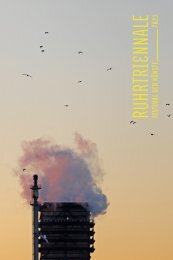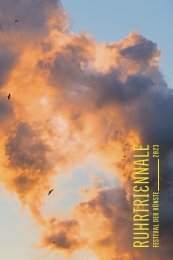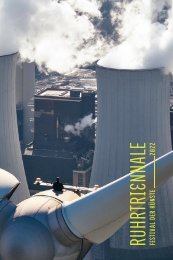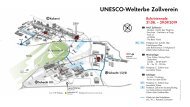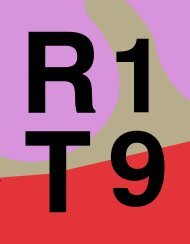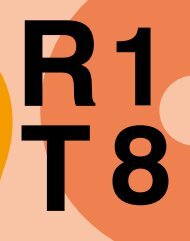Festivalkatalog der Ruhrtriennale 2022
Sie wollen auch ein ePaper? Erhöhen Sie die Reichweite Ihrer Titel.
YUMPU macht aus Druck-PDFs automatisch weboptimierte ePaper, die Google liebt.
Do you see more the closer you get? Or is does it get less and less visible? What I once<br />
easily un<strong>der</strong>stood from a distance to be a workers’ region, the coal and steel centre of<br />
Germany and the Revier, is getting increasingly difficult for me to recognise the closer<br />
I get. The Ruhr city is disintegrating into distinctly different individual parts; what does<br />
Kettwig have to do with Bottrop? The more time I spend in Bruckhausen and Langendreer,<br />
the less I can connect them. Year after year, the Ruhr region seems more complex,<br />
more confusing and more impalpable. And yet it’s always worth trying to tackle it. To<br />
grasp a region, to ask and see what connects Witten and Hochfeld. Where dramaturges<br />
like me, but also sociologists and spatial planners stumble, perhaps artists can help. For<br />
the magazine, we invited two artists to ask: how can the invisible become visible?<br />
Mischa Leinkauf is an artist from Berlin; Lütfiye Güzel is a poet from Duisburg. In their<br />
first meeting at a snack bar in Essen’s main train station, it quickly became clear that<br />
they both want to have a common language about the things, the world, the fries and the<br />
people around them. Given the openness they bring with them and their love for the Ruhr<br />
region, it is hardly surprising, and yet not self-evident, given that they both come from<br />
different worlds: »They always write about me: working-class child, grew up in Marxloh.<br />
Self-taught!«. »About me they always write: raised white flags on the Brooklyn Bridge and<br />
set off terror alarms in New York.«<br />
What paths led them to this snack bar at the main train station? While Lütfiye Güzel has<br />
lyrically described the realities of the Ruhr region with poignancy, bite and melancholy<br />
over the past 20 years, Mischa Leinkauf and his former partner Matthias Wermke have<br />
tested their behaviour, learned in post-reunification Berlin in the grey area between legal<br />
and illegal, in performative climbing actions on houses and bor<strong>der</strong>s in Korea and Mexico.<br />
Perhaps it is this search for the gap, the in-between and the special eye for structure that<br />
unites the two. Leinkauf and Güzel try to take on new points of view, to open up new lines<br />
of sight and thus gain an overview amidst the unclarity – or the other way around: to show<br />
unclarity in the supposed clarity. Leinkauf and his team spent days planning locations,<br />
getting permits, and finding ways to climb different high points of the Ruhr region in or<strong>der</strong><br />
to spot contrasts, to use strong contraction by zooming in to make old, familiar things<br />
contort in a different way. While Güzel, in her blackouts, crossed out words and sentences,<br />
un<strong>der</strong>lining them to make the new visible in the old. Stroke by stroke, she peeled out<br />
the core of what was to remain.<br />
Crossing out is just like fading out: not showing as much as focusing. With the technique<br />
of narrowing, the series of images developed for the magazine of the <strong>Ruhrtriennale</strong> <strong>2022</strong><br />
attempts to show what is not visible, to discover it by obscuring it. Less does not become<br />
more here, but something in the first place. Two people who look. Two views of structures,<br />
of the past and of the present. Of the ideas of the city and its remains. Of the ruins of<br />
yesterday and tomorrow.<br />
Aljoscha Begrich<br />
61




